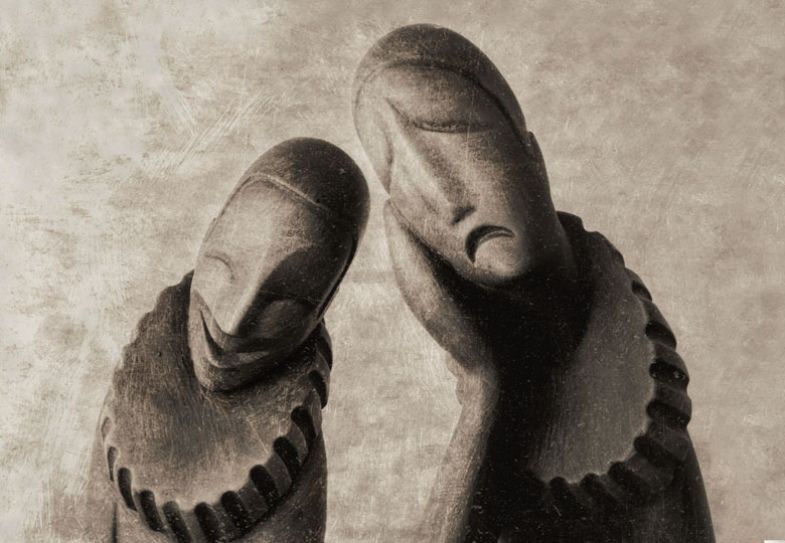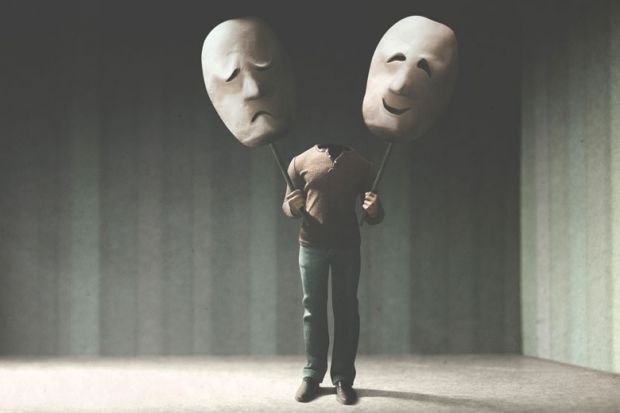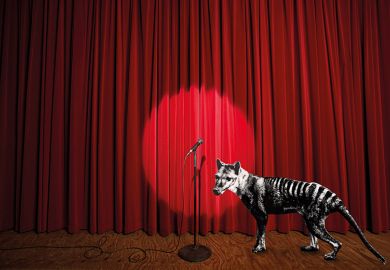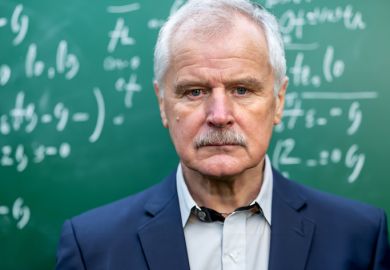The people who work in universities are made up of two tribes: tragedians and comedians. These tribes view each other with bewilderment across a seemingly unbridgeable mental and cultural divide.
What makes things worse is that the tribes are not named as such, and no one ever declares or even knows which tribe they belong to or why. All they know is that there is a whole bunch of people in universities with whom they have little in common. Perhaps, in the interests of collegiality, it would help if I introduced these tribes to each other.
In his pioneering work of ecocriticism, The Comedy of Survival (1974), Joseph Meeker discusses two literary-philosophical modes of thought that people have used to make sense of the fragilities and vagaries of life: tragedy and comedy.
In tragedy, the (almost always male) hero exists in a state of conflict with some force – nature, the gods, fate, death, his own self-defeating desires – that will ultimately overthrow him. He tries to escape his human limitations and fails. The audience feels both awe and pity for him as he follows this doomed project to its end. Tragedy concerns the human search for aggrandisement, the need to feel we matter in an uncaring, meaningless universe. It sees our efforts to transcend our animal nature as heroic, even if that heroism ends in death. In tragedy, the gods care enough about us to squash us when our pride and defiance angers them. Tragedy puffs up our species pride, our delusion that the universe gives a fig for human ideals.
Tragedy is a human invention – of the Athenians in the 5th century BC, and of cultures inspired by them, such as Elizabethan and Jacobean London. Comedy, by contrast, exists everywhere, even in nature. It grows artlessly out of life’s biological realities. Plants and animals live what Meeker calls “the comic way” in their pragmatism and pliability. Evolution for him is like a comedy, its aim being to allow life to thrive in all its myriad forms. Successful participants are not always those best able to destroy competitors, but those that can stay alive and grow.
Evolution favours variety over the ideal or optimal; it eliminates the unworkable and settles for the good enough. Healthy ecosystems maintain an equilibrium that avoids all-or-nothing rivalries and allows life to carry on. Similarly, the heroes (or antiheroes) of comedies may fall flat on their face, or lose their trousers, but they always survive. Comedy bids us respond to our human limitations with flexibility and compromise. The comic way seeks to enjoy and sustain life, because life is all there is.
In universities, the tragedians tend to occupy more senior positions, especially the upper echelons of management. They are not tragic heroes in the Greek or Shakespearean sense, of course: they don’t do dramatic things like stabbing their eyes out or dying in a pool of blood at the end of the fifth act. They don’t have Lear’s rages, or Othello’s jealousy, or Macbeth’s murderous lust for power.
No, they are tragedians because they think that humans can escape their fate as frail, mortal, imperfect beings. They put their faith in human-made ideals rather than natural laws. And they believe in chasing down these abstractions – usually given names like excellence, quality and innovation – endlessly.
In pursuit of them, they see universities not as delicately interconnected ecosystems but as places of rivalry and competition. They think not only that universities should compete with other universities, but also that individuals and groups should compete within universities for money, prizes and resources. A university, to a tragedian, is a collection of competing cost centres.

The admirable thing about tragedians is what genuine idealists, what true believers in the university they are. They treat the marks of distinction and esteem that academia has devised – titles, honours, university rankings, assessment exercises, data-driven performance indicators – as if they had some absolute, unquestioned reality in the world. Theirs is a tragic vision because it coats these anthropocentric creations with the veneer of necessity. They cannot imagine any alternative to this hard-driving, metric-oriented world.
Tragedians get things done. They believe in constant activity, the embracing of growth and change, the zealous production (even overproduction) of research “outputs” and “impact”. Unsurprisingly, they have a much bigger carbon footprint than the comedians. They hoover up the airmiles to attend international conferences and forge global partnerships, and they build shiny new campus buildings, often trumpeted as energy-efficient, even though the most sustainable solution would be to restore and refurbish old ones. (As eco-minded architects say, “The greenest building is the one that already exists.”)
Tragedians align perfectly with the values of the free market, because the free market is also a tragic concept. It, too, refuses to recognise our human limitations, because its aim is to go on forever, even at the expense of the destruction of the planet. It thinks of humans as mini-gods, unbound by the natural constraints that govern other living things. For Meeker, the tragic worldview lies at the heart of our environmental crisis. Its ultimate goal – infinite productivity, using only the finite reserves of energy on this earth – is impossible.
The university’s comedians, meanwhile, are baffled by all this busywork. They think that much of what goes on in academia – the ritualistic language, the unending meetings that generate more meetings, the power play and jostling for status and influence – is inherently comic. They believe that even the clever, able people who work in universities do foolish, irrational things. They know that underneath our carapace of smooth professional competence we remain what Shakespeare’s Falstaff calls “this foolish-compounded clay, man” – an error-prone, self-deluded, self-sabotaging animal. They see that much of what goes on in academia has no objective reality but happens within some closed circle of meaning we have drawn ourselves, then stepped inside and mistaken for the world.
The comedians tend to be lower down the institution’s food chain. They are the people on the ground, having to find concrete answers to the abstract visions of the tragedians, which looked so neat and plausible when summarised in bullet points and on spreadsheets. They are the office administrators who find workarounds for dysfunctional processes. Or the lecturers who try to convert the ineffable aspects of what they do into some diluted or semi-fictionalised form that bureaucratic and IT systems will recognise. They keep doing their job when they know that the software is hopelessly overengineered, the classroom tech doesn’t work, the website is unnavigable, the delivery strategy is undeliverable, and workload allocation models bear no relation to the work that they actually do.
Unwilling actors in this theatre of the absurd, they try to keep the show on the road in a collaborative, mutually tolerant way. They know that, as in a comedy, most things in academic life are a muddle that never gets resolved, but that the life of the university always goes on.
To be clear, comedians do not think that their work is absurd or meaningless. They are no less hard-working and dedicated than the tragedians. They only suggest that the meaning of university life can’t be found by running after intangible ideals. Instead they relish the detail and materiality of the everyday, the snatched moments where pleasure and purpose come together: the buzzy feeling after a good class, the discussion with a student that really seemed to cut through, the click of recognition in their own research when an idea or sentence falls into place. None of these things are measurable, and yet to a comedian they are what makes the work matter.
Recently, I helped to clear out some archived material from my department when we had to empty a storage room. We sorted everything into recycling or confidential waste sacks: handbooks from now defunct modules, old undergraduate dissertations that had to be chucked under data protection legislation, reams of papers from previous assessment exercises and revalidations, decades-old minutes of meetings. It was a salutary lesson in how the business of the university, so urgent and invested with meaning at the time, gets eaten away by the years. And yet it was impressive as well, all this evidence of forgotten labour, done just to keep things ticking along and ensure that the human comedy went on.
To a tragedian, a comedian’s approach seems hopelessly woolly and unrigorous. The comedian replies that true rigour requires that we take account of subjectivity, and of how the most robust and consistent procedures are muddied by flawed, uncomputable, glitch-ridden humans. But surely, says the tragedian, this is all woefully lacking in ambition. We can’t just bumble along as we’ve always done! The comedian replies that they are not against change, just the pre-set, top-down, life-sapping variety enforced through “change management”. Comedy, they point out, is as adaptive and creative as the natural world. It lets a thousand flowers bloom, each flourishing in their own way. It recognises that our most imaginative and lasting achievements emerge out of an alertness to our messy, mercurial, fallible natures.
By now you may have guessed which tribe I belong to. I am a comedian. The tragic way has its uses and boasts many accomplishments. Humans are storytelling animals, and all work relies to some extent on the suspension of disbelief, a faith that it matters more than it actually does. We all need to believe in something.
Pushed too far, though, the tragic way becomes joyless. It makes people feel ashamed and guilty that they are not living up to its ideals – ideals that can never, in fact, be lived up to. For you will never produce enough outputs, never have enough impact, never secure enough funding, never be trained enough, never be innovative enough, never be excellent enough. The tragic way turns us into martyrs who see work as sacrifice and suffering. It explains much about why so many people in universities – even those in secure, well-paid jobs doing work they believe in and enjoy – feel stressed, harassed and miserable.
The other day, I was completing an online form on one of the many data management systems I am required to use as part of my job. I had to get a box to turn from red to green, to show that data had been provided to the satisfaction of the algorithm. I did not think the information being asked of me was useful or relevant. I typed “not applicable” into the box. The algorithm swiftly shot back that this answer had “an insufficient number of characters”. I typed “This is not applicable” into the box.
The box went green. The comic hero’s victories are small, but, as Meeker writes, “he lives in a world where only small victories are possible”. Oh yes, I thought, I am a comedian.
Joe Moran is professor of English and cultural history at Liverpool John Moores University.
Register to continue
Why register?
- Registration is free and only takes a moment
- Once registered, you can read 3 articles a month
- Sign up for our newsletter
Subscribe
Or subscribe for unlimited access to:
- Unlimited access to news, views, insights & reviews
- Digital editions
- Digital access to THE’s university and college rankings analysis
Already registered or a current subscriber? Login








